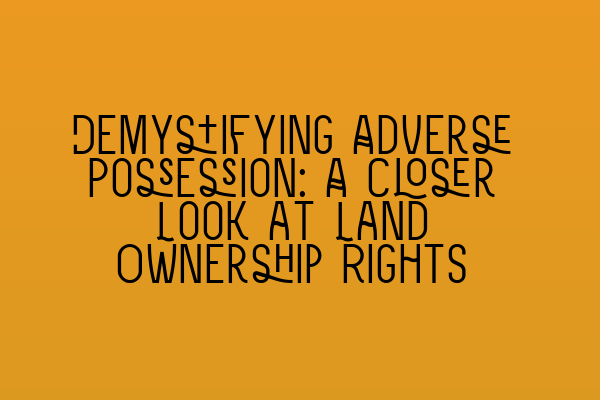Demystifying Adverse Possession: A Closer Look at Land Ownership Rights
When it comes to land ownership rights, one concept that often raises eyebrows and sparks curiosity is adverse possession. Adverse possession is a legal principle that allows an individual to claim ownership of someone else’s land by occupying and using it openly, exclusively, and continuously for a certain period of time. Although it may sound peculiar, adverse possession has a long history and serves a practical purpose in property law.
In this article, we will demystify the concept of adverse possession, explore its origins, discuss its requirements, and shed light on its implications for land ownership rights. Whether you are a property owner, a prospective buyer, or a legal professional, understanding adverse possession is crucial to protecting your land interests.
The Origin of Adverse Possession
Adverse possession has its roots in common law, dating back centuries. Its purpose was to encourage the efficient use of land and prevent disputes over long-abandoned properties. By allowing someone to claim ownership of land through adverse possession, the law intended to provide stability and prevent the wasteful neglect of valuable resources.
Over time, adverse possession principles have been codified into statutes, providing a clearer legal framework for establishing ownership rights through adverse possession. However, the fundamental requirements have largely remained the same.
Requirements for Adverse Possession
Adverse possession requires meeting certain criteria to successfully claim ownership of land. These criteria may vary slightly depending on the jurisdiction, but the general principles remain consistent.
1. Actual, Open, and Notorious Possession: To claim adverse possession, the occupier must physically possess the land openly, visibly, and without any attempt to hide or conceal their use. The possession must be evident to anyone who observes the land.
2. Exclusive and Continuous Possession: The occupier must possess the land exclusively, meaning that no one else has a simultaneous right to the same property. Additionally, the possession must be continuous without any substantial gaps or interruptions for the required statutory period.
3. Hostile and Adverse Intent: The possession must be hostile or against the interests of the true owner. This does not necessarily mean malicious intent. It simply means that the occupier possesses the land without permission from the owner.
4. Statutory Period: Most jurisdictions have a specific statutory period that the occupier must fulfill to claim adverse possession. This period can vary but is typically around 10 to 20 years. Once the statutory period has been met, the occupier can apply to the relevant land registry to officially claim ownership.
The Implications for Land Ownership Rights
Adverse possession raises important questions regarding land ownership rights. Can someone simply occupy your land and eventually claim it as their own? While it may seem unfair, adverse possession exists to strike a balance between stable land ownership and the efficient utilization of resources.
However, landowners should not fear losing their property through adverse possession. The requirements for adverse possession are rigorous, and the burden of proof falls upon the claimant. Moreover, diligent property owners can take steps to prevent adverse possession by regular inspection and assertion of their ownership rights.
Conclusion
Demystifying adverse possession provides a clearer understanding of the intricacies involved in land ownership rights. While it may seem like a perplexing concept, adverse possession serves a practical purpose in property law. Understanding its origins, requirements, and implications empowers property owners to protect their interests and legal professionals to provide informed advice.
If you want to explore more about the SQE, check out our related articles:
